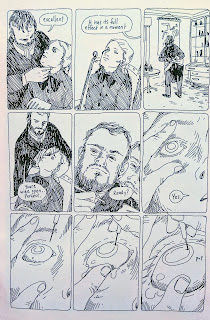Having followed her career from the beginning, I've always appreciated her fragile, ratty line that often seems like it's about to disintegrate at any given moment. Given that she loves to explore the intersection between sex, bodies, and horror, her drawings have a visceral quality that is at once erotically charged, disturbing, and desperately familiar. All of this is on display in Vision, her 2020 book from Fantagraphics. At its heart, this is a story about desperate loneliness and yearning, mixed with a series of betrayals and boundary violations. It's also deeply steeped in BDSM concepts, as the lead character Eleanor is a widow tending to her perpetually-ill sister-in-law and her distracted brother. She also regularly talks to a demonic spirit in a mirror, who orders her to strip naked and pleasure herself, even as he calls her out as someone who desperately wants to be used and degraded.
Set in the 19th century, Eleanor's choices are even more limited because of the era, and how her voice is constantly silenced by those around her. All the while, her vision is starting to go thanks to cataracts, leading to an encounter with the eye doctor that is at once a violation and arousing because it is a violation. One of the best things about Gfrörer's work is that her narrators are often unreliable, and that the reader must follow what they do rather than what they say. For Eleanor, despite all of her stiff-upper-lip performative strength, she's a shattered woman clinging only to her desire for meaning. That desire is toxic and unsustainable, whether one takes the supernatural elements of the story at face value or sees them as a manifestation of her own insanity. In the end, it doesn't matter.
She's not allowed to grieve her husband openly, and any emotions she feels are immediately shot down by her sister-in-law Cora and her brother Robert. While the book opens with her talking to her magical, quasi-demonic mirror that is her effective voyeur dom, she really does have the best interests of her family at heart. Her brother, it is implied visually, is sexually assaulting his physically and mentally ill wife in her sleep, tearing open her nightshirt that Eleanor rebuttons. For both Eleanor and Robert, there's a sense that their desires cannot be contained and are making both of them want to act with no restraint. Only Robert is allowed to get away with it openly, however.
When Eleanor tells the ghost in the mirror that she wants to go where he is, it's a desire to be touched and act on her sexual impulses--but it's also implied that this is a self-annihilating act. The ghost is dead, in hell, or someplace even worse, and Eleanor has a firm suspicion that she's hellbound no matter what. With her self-cutting early in the book, it's clear that she's trying to externalize the pain and scarring she feels emotionally, but the ghost feels like a chance to evade this. The ghost makes her feel desired and reads her for what she truly is: a submissive who seeks out pain, seeks out degradation, seeks out and wants to revel in sexual debasement. For a sub, being able to access this kind of emotional space with a trusted partner can be deeply healing; for Eleanor, she only has more pain to look forward to.
When the doctor treats her cataract, the ghost demands she describe the pain in detail, with the procedure described in such a way as a dom controls and gives pain to a sub. The ghost's reaction mirrors her own in a way; it cracks, mimicking Eleanor cutting herself earlier. The mirror is possessive and jealous of Eleanor, and what remained her sole outlet for her desire is cruelly cut off. The leads to her spiralling, as her tolerance for her situation evaporates. She welcomes advances from the doctor (despite the ghost smashing a paperweight in protest), poisons her sister, and gets lost in laudanum dreams as she fantasizes about joining her ghost lover. In the end, her ghost lover never returns, and she makes a fateful decision for her brother and herself.
This is perhaps the grimmest of all of Gfrörer's stories, and the one with the least humor. While her protagonists either tend to be in bleak situations, victims of outside forces, or predators in their own right, Eleanor is doomed from the beginning. She's grieving but given no space to grieve; her desire, need, and loneliness are all subsumed to the needs of her family; and there's no real way out. Even the doctor who wants her cares less about social calls (despite his veneer of respectability) and more about dominating her. A soft dom, perhaps, but a dom nonetheless. The only being who understands her is either a figment of her imagination or a largely malignant spirit. In the end, it doesn't matter, given the hopelessness that she understands all too well. She chooses self-annihilation over misery, as she can't see a way out. The pain expressed in this book lingers long after it's read.








No comments:
Post a Comment